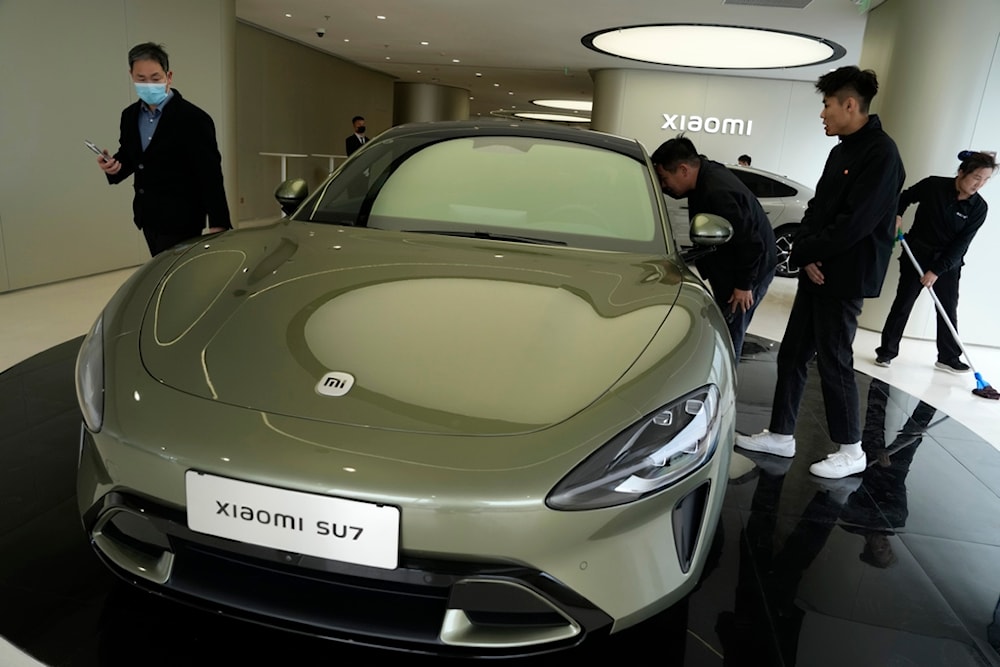EU votes for tariffs on Chinese EVs; auto industry slams decision
The imposition of definitive tariffs on Chinese electric vehicles has garnered backlash from the electric mobile industry, calling for different solutions.
-

Visitors to the Xiaomi Automobile flagship store look at the Xiaomi SU7 electric car on display in Beijing, Tuesday, March 26, 2024 (AP)
The European Union has voted to impose definitive tariffs on Chinese battery electric vehicles (BEVs) on Friday.
"Today, the European Commission’s proposal to impose definitive countervailing duties on imports of battery electric vehicles (BEVs) from China has obtained the necessary support from EU Member States for the adoption of tariffs," a statement released by the EU read.
However, China's Chamber of Commerce expressed "disappointment in the voting outcome of the EU's adoption of protectionist trade measures." It further urged the delay of the implementation of such tariffs and the contemplation of different solutions through negotiations.
This comes as the EU stated that despite the voting outcome, it would continue looking for other solutions.
Moreover, the Chamber of Commerce reiterated its position, saying the imposition of high tariffs on Chinese electric vehicles was "politically motivated and an unjustified protectionist measure," which would backfire not only on Chinese companies but also on international ones carrying out production in China.
Industry reactions
German automakers, including Mercedes-Benz, BMW, and Volkswagen, have criticized the EU's decision to impose higher tariffs.
Mercedes-Benz called the tariffs a "mistake" with potentially severe consequences, urging the EU to delay the implementation and continue negotiations with China. BMW labeled the move a "fatal sign" for Europe's auto industry, while Volkswagen said the tariffs were the wrong strategy, advocating for a negotiated solution to avoid a trade conflict.
Volvo Cars, owned by China's Geely Holdings, reaffirmed its commitment to building cars where they are sold and investing in Europe. Stellantis highlighted the pressures from CO2 reduction plans and Chinese competition, stressing the need for policies that support demand and ensure stability.
At the time of reporting, European auto stocks were up 1.72%.
China requests WTO consultations over EU tariffs on EVs
Last month, China launched a dispute settlement procedure at the World Trade Organization (WTO) regarding the European Union's tariffs on Chinese electric vehicles, the WTO announced.
The Chinese Commerce Ministry reported that Beijing had appealed to the WTO's dispute settlement mechanism over the EU's tariffs on Chinese electric vehicles.
"China has requested WTO dispute consultations with the European Union regarding the EU's anti-subsidy investigation on imported battery electric vehicles from China and the subsequent imposition of provisional countervailing duties on the targeted vehicles. The request was circulated to WTO members on 14 August," the WTO said in a statement.
In early July, the EU imposed provisional tariffs of up to 37.6% on these vehicles, arguing that Chinese automakers benefit from substantial government subsidies, which give them an unfair advantage in the European market.
China however disputes this characterization, asserting that its support for the EV industry is in line with WTO rules.
The Chinese government says it views the EU's actions as a violation of international trade norms and a hindrance to global cooperation on climate change

 3 Min Read
3 Min Read








